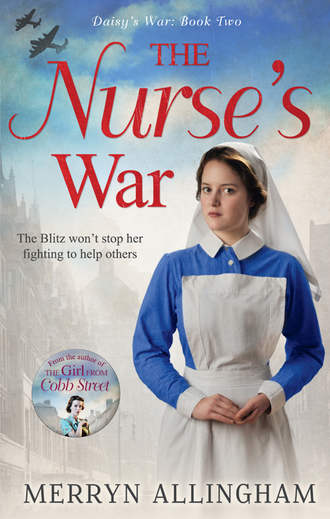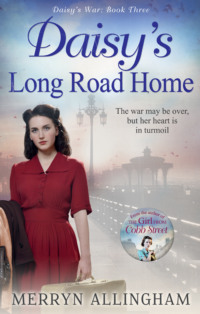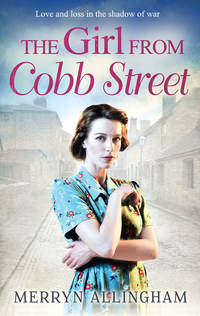
Полная версия
The Nurse's War
‘I made up a story.’ Of course, he would have. ‘I said I was a businessman—said my name was Jack Minns and I was trading in rapeseed. There’s plenty of that around Jasirapur and they didn’t question my account.’
She considered how credible that might sound. Gerald had not been in uniform, she remembered. He would not have had any form of identity on him. His story would be the only one in town.
‘But how did they think you’d ended up in the river?’
‘That was easy to explain. The celebrations got a bit boisterous. They always do, don’t they? And somehow I tripped and fell, and my friends weren’t able to reach me because the river was flowing too fiercely.’
‘Then surely they would have sent to Jasirapur for someone to come and collect you.’
He shook his head. She noticed a crafty smile playing around his lips. ‘I told them the friends I’d been with were also traders and by now they would have moved on, travelling north-westwards. That was the direction I intended going, towards the Persian border. I told them that once I was on my feet again, I’d start out and join them. And I did. Not join them, of course, because they didn’t exist, but I travelled north-west to the border.’
‘Without money?’
‘There are ways. The villagers sent me off with a few rupees and India is full of temples.’
‘You begged your way to the border!’
‘More or less.’
‘And after that, when you got to Persia?’
‘I scrounged whatever I could, then when I reached Turkey, took whatever job I could get. Anything that would feed me. Once I had sufficient money, I travelled on to the next place. It was bloody awful, I can tell you. The things I had to do … but once I reached France, life improved. I travelled up the country as far as Rouen and got taken on as a waiter in a local bistro. The tips were good and I actually enjoyed the life—not waiting, of course. Being at everyone’s beck and call didn’t suit me at all. But the idea of running a restaurant, that really appealed and still does. When I get to the States, that’s what I’ll do. It’s America I want to go to.’
She had been listening to him in disbelief. How much credence should she give to this account of his travels? Could she really imagine the arrogant young cavalry officer she’d known begging at temples, or scavenging food bins or waiting on tables? Or was that as much a fantasy as his plan to open a restaurant in America without money and without papers?
She said none of this. Instead, she asked, ‘If you liked the life in France so much, why didn’t you stay?’
‘Ever heard of Hitler? That’s why, Daisy. The Jerries were about to invade and it wasn’t safe. I’d picked up a bit of French here and there, but any German soldier with the slightest ear would know I was English. If they found me, I’d have been interned immediately. I reckoned I might as well languish in prison here as there.’
He saw her surprised expression. ‘Not that I’ve any intention of languishing anywhere, but I did need to get to England pretty damn quick.’
‘And you did.’
‘I met a chap at the restaurant. He used to eat there pretty regularly. He was English but had been living in Rouen for years. For a while he’d been holding his breath over the political situation, but once the Germans invaded Poland, we both knew the game was up. France as well as Britain declared war two days later and it was only a matter of time before the Germans arrived. The bloke decided to make a bolt for it back to England. Fortunately, he owned a car and I travelled back with him.’
‘I see.’
She didn’t really. She couldn’t understand how Gerald had managed to get past border controls without a passport or any form of identification. But in wartime everything was in flux and he must have looked and sounded the English gentleman. She imagined he’d told them some sad story and got them to believe it.
‘So where are you living?’
Her question was deliberately bland. When he’d appeared on her doorstep the night before last, he had let slip that he’d looked for his parents in the East End, but he was not about to confess the layers of mistruth he’d been spinning ever since she’d known him. And now his mother and father were gone, wiped out by a German bomb, there seemed little point in raking up old lies.
‘The East End,’ he said awkwardly. ‘Whitechapel.’
She remembered the address he’d given her, a shop in Gower’s Lane. She knew the road and it struck her that it was only a stone’s throw from Spitalfields, where they’d both been born. He misinterpreted her silence and said defensively, ‘I’ve hardly any money and it was the cheapest lodging I could find.’
She was still thinking. She had a very small sum saved. Should she offer it to him, or was that ridiculous? It was nowhere near enough to purchase a berth on a ship to New York. And that was without reckoning on those all-important papers. Even more important in America, she imagined, since the country was not at war and would police its borders rigorously.
‘Is the interrogation officially over?’
He smiled across at her and for an instant she glimpsed the old Gerald, the man with whom she had fallen so deeply in love. Or thought she had. His fair hair gleamed bright in the spring sunshine and though his cheeks were emaciated and his frame thin, he could almost be the same handsome man.
‘I’m sorry if it sounded like an interrogation. I didn’t mean it to be. But so much has happened to both of us since …’
She saw a quick flush mount to his face. ‘I gather Grayson Harte rode to your rescue.’ So far he’d said nothing about that terrible night, but that was not surprising.
‘So you know what happened?’
‘The tale spread like wildfire. Tales always do in India. The village was naturally desperate to hear the gossip from up river and siezed on anyone who’d been in Jasirapur. But the story they got was only half a one. I gathered from their talk that the gang had been apprehended and put in jail awaiting trial, but I heard nothing about you. I had no idea if Harte and his minions turned up in time.’
‘As you see, they did.’
There was a cold silence as they sat staring across the lake, small ripples now disturbing its surface. A stiff breeze had begun to blow and the little red painted boat was bobbing precariously away on the waves. The small boy started to cry.
Gerald shifted irritably in his seat. ‘So—what’s your plan?’ he repeated.
CHAPTER 3
‘I don’t have one.’
Apparently they’d said all they were going to say about the terrifying event they had shared. India was to be a closed subject between them.
‘What do you mean, you don’t have one?’
‘I told you, Gerald, I have no idea how I can help you.’
‘Jack,’ he interrupted her.
‘Jack,’ she repeated, though the sound of the name stuck on her tongue. ‘I’ve very little money but you’re welcome to what I have. I doubt, though, it will get you much further than Southampton. And as for the papers, how am I to get them?’
‘You’re a nurse. You have patients.’
‘What has that to do with anything?’
‘Patients are always grateful to their nurses and some of them must have influence. Surely you can use that.’
‘I work at St Barts, in the City.’
‘A City man then. Perfect.’
‘The City men, as you call them, go home to the suburbs at night. They have transport and money to escape the raids. It’s the East End that suffers—you must know that—you’re living there. Its people are our patients, people from small terraced houses, from crowded tenements, people with very little and even less when the bombers have finished. They’re grateful certainly, but influential, no.’
‘You’ve changed, you know. You’ve become a hard woman.’
‘Because I can’t help you? You’re being foolish.’ She looked away from him. ‘If I have changed,’ she said slowly, ‘it can only be a good thing. At least for me. It means that for the first time in my life, I’m strong enough to defend myself.’
He had the grace to look uncomfortable, but it didn’t stop him from worrying at her.
‘Grayson Harte was never a district officer in India, was he? I knew from the first he was an imposter. I told you so, didn’t I?’
She said nothing, wondering why he should alight on Grayson’s name again. She wasn’t left in ignorance long.
‘I’ve been thinking.’ He stretched his long legs and relaxed back into the canvas sling. ‘The district officer role was just a blind. Harte was in Secret Intelligence, wasn’t he? Most of those beggars are working in London now, I’ll be bound. Harte may have had to stay in India for the gang’s trial, but he can’t be there still. He’s almost certainly close by and if we’re talking influence, who better than an SIS officer to help me?’
She swallowed hard. It was exactly what Connie had said, but she hadn’t wanted to listen to her and she didn’t want to listen to Gerald either. Contriving a meeting with Grayson was the last thing she’d expected to do, and the last thing she wanted.
‘Nothing to say? Harte always had a soft spot for you. Sweet on you, I thought at the time. And he proved your white knight in the end, didn’t he?’
There was a new bitterness to his voice. Even now, she thought guiltily, even now that she had Gerald beside her, flesh and blood and alive, she hadn’t thanked him for his final act of heroism in trying to save her life. She should do it, but she couldn’t. She couldn’t bring herself to utter the words. Her sense of betrayal was just too great.
‘Who better to get me my papers?’ he taunted.
‘I don’t see Grayson.’
‘Now, I find that remarkable.’ He gave a smirk. ‘I thought he’d be a regular at the Nurses’ Home.’ She could have hit him but instead clenched her fists tightly. He looked down at her hands and the smirk grew. ‘What’s the matter? Didn’t it work out between you? That’s sad. But then comfort yourself with the thought that it wouldn’t have worked out anyway. You have a husband alive and Grayson is far too much of a gentleman to steal another man’s wife.’
‘I don’t see him,’ she repeated heavily.
‘But you could. If you chose.’ He leant over and took her hand. His touch was far gentler than she expected. Rhythmically, he stroked her forearm. She would have said it was a loving touch if she hadn’t known better. ‘And you could choose, Daisy.’
‘I haven’t seen Grayson Harte for months. We’ve gone our own ways.’
‘I’m sure you know where he works though.’ She didn’t answer and he took her silence as confirmation. ‘You could pay him a visit. Call on him for old times’ sake. Don’t mince your words—tell him your husband has reappeared and is an embarrassment, an embarrassment you’d like to get rid of. I’m sure he’ll find a way of obliging.’
‘I can’t turn up out of nowhere and demand papers for you. He’ll want to know why you’re here, how you got here. He’ll know you’ve deserted. What if he decides to turn you in?’
‘Dear Daisy, he won’t. Because, if he did, you would be implicated. You would be the wife of a deserter. Think how your nursing colleagues would react to that little piece of news, think what the hospital might do. About your job, for instance.’
‘You’re threatening my job?’
‘Not threatening, merely pointing out the salient facts—as a friend, of course. You really would be best to keep my unfortunate situation as quiet as possible, and Mr Harte will appreciate how necessary that is. He’s a master of discretion, I’m sure.’
She was caught. She could feel the underlying menace in every one of his words. If he didn’t get papers, didn’t get money and a way out of England, he wouldn’t go quietly. If he were taken into custody, he would shout his story to the sky and it would spread like a fungus, inching its diseased path into every crevice of her life. Including her workplace. And the job she loved would be in ashes, another dream destroyed.
‘If I go to him and he refuses to help—even if he doesn’t inform the authorities you’re in London—will you leave me alone?’
‘He can’t refuse.’ Gerald’s tone was adamant. ‘He has to help. My situation is desperate. Spies are his forte, aren’t they, and I’m surrounded by them. I have to get out now.’
Her eyes widened. ‘Surrounded by spies?’
‘Yes, spies. I’m almost certain of it.’ She recalled the anxious scanning of the park before he’d consented to sit down. It seemed he believed what he was saying. ‘There’s something odd about the two men who rent the room below me. For a start they’re both Indians. Well, one is Indian, the other’s Anglo. I met the Indian chap on the landing one day and he said he was a soldier. I saw his cap, it had the badge of the Pioneer Corps pinned to it, so I reckon he was telling the truth. But why isn’t he with his regiment? And if he’s left the army, why hasn’t he returned to India? There has to be something going on, some reason they’re hanging around. They’re watching me, I’m sure. They must know I’ve deserted.’
‘How can they know?’ The claim seemed utterly absurd and she wondered if Gerald’s ordeal had affected his mind as well as his body.
‘If they don’t actually know, they suspect. Think about it. I’m an able-bodied man of twenty-eight, yet I’m not with any of the Services and I’m not engaged in essential war work.’
‘And are they? They might be deserters too.’
He shook his head. ‘Deserters from what? The character from the Pioneers has a limp, so he’s unfit to fight. I know his unit was brought over from the Punjab to work on demolition. Clearing derelict buildings, that sort of thing. Some of them were skilled engineers. They’d need to be, using dynamite. He might have been one of them and suffered an accident. But that doesn’t explain why he hasn’t been put on a boat back to India. He’s not British and he shouldn’t be here.’
‘And the other man, the Anglo-Indian?’
‘Yes, what about him? What the hell is he doing in this country?’ Gerald’s voice rose and she could see panic bubbling beneath the surface. ‘Why hasn’t he been interned with everyone else, I ask you? Every foreigner, anyone who might assist the enemy, even the poor blighters who’ve escaped from Hitler, has been banged up.’
‘But why should these men be a threat to you?’ She hoped a quiet voice would calm him.
‘They are, I know they are.’
She had never known her husband so agitated, not even in the dark days of mischief in India. His voice had risen even higher and Daisy saw the woman who had just rescued her child’s boat look up, perplexed by the sound.
‘They sent me a white feather. How about that? It was under my door this morning. You know what that says.’
‘Cowardice?’ She hardly dared say the word.
‘Precisely. They’re calling me a coward. The next step will be to denounce me to the authorities.’
‘But how do you know they were the ones who posted it? It could have been anyone in the neighbourhood.’
‘I can’t be entirely sure, but who else would it be? They’ve been watching me closely and they know my movements, know I don’t have a job. And that I’ve a connection with India. They speak to each other in Hindi and I accidentally let on I understood some of what they were saying. That must have made them even more suspicious.’
She shook her head. Gerald was imagining a persecution she was certain didn’t exist. He had built a ridiculous story around two innocent men, interpreting their looks and actions in the worst possible way. It was because he was strung tight by the fear of discovery, she could see, and if he didn’t get away soon, he was going to do something very stupid. She had no alternative. She would have to try to help, even if it meant searching out Grayson and braving a face-to-face meeting with him.
‘I’ll go to Baker Street. That’s where Mr Harte works. I’ll try to see him.’ There was only a slight quiver to her voice.
‘When?’ The question was urgent. Her promise had not been sufficient to calm him.
‘As soon as I have time off.’
‘Soon?’
‘Yes, soon.’ She looked at her watch. ‘I must go now. If I have any luck, I’ll send a message to the address you gave me.’
‘You’ve got to have luck.’ And his tone allowed for no other outcome.
The meeting had been unsatisfactory. He wasn’t sure he could depend on her to go to Grayson Harte. He’d said she had changed and he’d been right. Not to look at. She was still as pretty, prettier if anything. She’d filled out since he’d last seen her, become more womanly. The dark eyes, the darker hair, the skin that in an English climate had regained its smooth creaminess, not quite peach, not quite olive, but soft and clear, still drew him. Was it any wonder he’d lost his head all those months ago in London. It had been a thoroughly boring leave, he remembered, and then he’d gone to buy perfume for the woman he’d decided to love, and there she’d been. Beautiful Daisy. He’d meant only to enjoy a few days with her, but the days had stretched into several weeks and, when he’d left to go back to India, he’d felt real regret. Although not that much regret, he supposed. He’d been looking forward to rejoining his regiment, getting back to the pleasures of life as a cavalry officer. Looking forward, too, to seeing Jocelyn Forester. He’d set his sights on winning the colonel’s daughter and was sure in time that she would reciprocate. The perfume was the first step in his campaign.
But then those pleading letters from Daisy. A baby was coming, she had to marry. And what had that been all about? A miscarriage on-board ship, no baby and a marriage he didn’t want. He’d been angry and he hadn’t treated her well. He didn’t like to think of those days. He’d betrayed her, he knew, betrayed her for money, that’s what it came down to. He’d allowed Anish to talk him into a pit of evil. Just for money, just to pay the debts which terrified him. He’d had no idea that Daisy would prove so difficult, so obdurate, so intent on involving herself in what didn’t concern her. Until eventually she’d faced death. Even now he couldn’t believe that Anish had sanctioned such a thing. It was too awful to think about. He’d done his best to save her, but it had been Harte, the perfect district officer, who’d finally been her rescuer.
No, he didn’t like to think of those days. She’d been a gentle girl when he met her, vulnerable and soft. Now, though, she seemed to have grown a shell and he could only hope that he’d managed to pierce it today. He wasn’t entirely convinced she would do as she’d promised. Something had happened between her and Grayson Harte which made her reluctant to meet the man. She had better though, he thought belligerently. He’d hated having to confess the hole he was in, having to abase himself by begging for help, but he’d had no choice. No choice either about holding a threat over her head. He could congratulate himself on that at least. He’d hit on the right thing—her job—he’d seen that immediately. The threat of having to leave nursing would make her do what he asked, whether she wanted to or not. It would get him the papers, if anything would.
He trudged his way back through the West End and into the City, his feet aching and sore. There had been a big raid two nights ago and the roads were still badly damaged. He’d hardly seen a bus on his way to Hyde Park, but even if one had turned up, he couldn’t afford the fare. He could barely afford to eat and the small sum he’d saved from working in France was dwindling by the day. Look at his shoes—the soles almost falling off, the backs broken down. Dear God, what had he come to? A proud officer in a crack regiment of the Indian Army and now this, hiding away in a dingy, rat-infested room, and dependent on others for his deliverance.
But then he’d always been dependent, hadn’t he? His whole career had rested on a father who’d sacrificed everything for his only son. An ungrateful son. And that was something else he didn’t want to think about. When he’d returned to England, Spitalfields was the first place he’d gone to. He’d had some wild idea that somehow he could reconcile himself with the parents he’d abandoned, the prodigal son returned, that kind of thing. An unspoken thought, too, that maybe his father could get him out of his predicament as he had so many others in the past, though what a poverty-stricken old man could do, he didn’t know. But when he’d rounded the corner of the street—the address had been at the top of the letter his father had sent, begging for money his son couldn’t spare—he’d been appalled. There was nothing, literally nothing. A whole street had disappeared.
After two years of war, he thought, London smelt of death and destruction. Everywhere shattered windows, roofs caved in, water pipes, gas pipes, all fractured, telephone wires waving in the breeze. The people he passed were every bit as shabby as their city since new clothes were a rarity. Shabbier still in the East End where, for a pittance, he’d managed to rent a room. Street after street of mean little houses with open doors and broken windows; filthy alleys in which ragged children played, their pale, pinched faces speaking of years of deprivation before ever the German bombers arrived. And everywhere stank—of waste, of unwashed bodies, of stale beer.
He was walking through the City now, past one ruined church after another, their steeples scorched and dis-coloured by fire. There was something heroic in their tragic silhouettes, he thought, heroic yet futile. They belonged to a past that no longer had meaning. It was the New World that promised, the New World that offered a future. In front of the Royal Exchange, an enormous hole in the road had still not been completely filled after the Bank station had been hit in January. So huge was it that the Royal Engineers had had to build a bridge across for people to get from one side of the street to the other. The East End had fared even worse, of course. Whole terraces mown down and streets almost entirely rubble. Grotesquely, the building on the corner of Leman Street, he noticed, still had a side wall intact and a framed view of a Cornish landscape hanging from the picture hook. He crunched his way along the pavement, littered with shards of glass and cracked roofing tiles. The breeze had begun to blow strongly again and pillows of white dust swirled around him. For a moment he had to stand still, his eyes closed against it.
Turning into Ellen Street, he saw the lodging house ahead, black roof and sightless windows, hovering against the clear blue sky. It loomed discordantly over the dribble of smaller houses, as though it had risen from the pages of a Nordic fairy tale and found itself out of time and out of place. Several of the surrounding properties had been hit on successive nights and had crumbled at one blow. That didn’t surprise him, knowing how shoddily they were built, but at least the debris was light enough for more survivors to be pulled free. Alive but dispossessed. The house adjoining his had had its front cut away as though it were a doll’s house. Skyed high in the air was a dented bath and a lavatory, with a sad little roll of toilet paper still attached to the door. A staircase led to an upper floor that no longer existed. But the house where he lodged had survived all attacks—so far.
He trod up the stairs as delicately as he could. The ground floor of the house was occupied by an old woman, ninety if she were a day, half mad he was sure. He glimpsed her sometimes through her open door crooning quietly to a cat or slumped in a fireside chair, staring blankly at the bare wall in front of her. Sometimes she would stir herself to fling random curses at whoever was unlucky enough to catch her glance but she rarely noticed his comings and goings, being so deaf that a bomb could have fallen outside her window and she’d not have flinched. It was when he approached the first floor that he steeled himself to tread more softly still. He tried to shut his mind to the ill will he imagined lay beyond that door.
His years in the army had given him a nose for danger and he was sure the men who lived there were up to no good. It wasn’t just that they’d ended their conversation the minute they realised he understood Hindi, nor the sheer absurdity of finding two Indians living in the middle of the East End in the middle of a war. It was the nagging matter of why they were there. The Indian might be a soldier as he claimed, and the man’s cap badge seemed to prove it, but why wasn’t he with his regiment or returned to India? And what was the Anglo doing here? You couldn’t trust Anglo-Indians, they were neither one thing nor the other, neither British nor Indian. Some of them had chips on their shoulders for that reason. Did this one? Did the man mean to expose him as a deserter, imagining perhaps that he’d be paid for the information?






